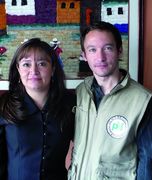Article published in the special Newsletter '15 years of PBI', October 2009
José Antonio Serrano, volunteer from Spain (2008-9)
Due to her work for the respect of human rights, Soraya Gutiérrez and her daughter face threats and illegal surveillance.
Four years after an attempt on her life and serious direct threats against herself and her family, recalling the events still brings tears to lawyer Soraya Gutiérrez’s eyes. She inevitably links it to recent acts of espionage and surveillance that are part of the DAS’s Operation Transmilenio1 of which she has been subject as a member of the José Alvear Restrepo Lawyers’ Collective (CCAJAR).
In February 2003 Soraya was working on the case of a massacre that occurred in El Páramo de la Saran, where fifteen people were assassinated whilst travelling by bus. Days after meeting with victims of this massacre, the lawyer was heading for her home in Bogotá, driving the armoured car that she had been assigned. Another vehicle crossed her path. Three heavily armed men got out and tried to force her to get out of her vehicle. Fortunately she managed to escape and reach home. On previous occasions, Soraya and those around her had been followed and subjected to intimidating acts. All these acts were appropriately reported. Nevertheless, according to Soraya, they never obtained a satisfactory reply from the authorities and there was no proper investigation. Nor was there an investigation following the new threats that she was subject to two years later, this time involving her daughter. In addition to the child’s school bus being followed, a parcel addressed to her daughter was received at home, falsely sent in the name of her grandfather. Inside the parcel was a dismembered doll painted with red nail polish and a note saying: «you have a very beautiful family: don’t sacrifice it».
The impact on Soraya’s personal and professional life was enormous. «When you take on human rights work in a country like this, you put your career and your profession at the service of the fight against impunity. You know that you run a certain risk and you are prepared for that. It is different when they go for your weak point, your family and loved ones. The impact is very severe». These events seriously affected her familial and married life, forcing them to move and influencing her daughter’s childhood development. But nonetheless, she continued with her work. «In the first months that followed I was very distressed, but I never thought about leaving the country permanently. I am convinced that I am not going to leave Colombia. I am never going into exile. I am convinced that the work to defend human rights has to be done here. Those who want us to leave are never going to get their way, at least not with me».
It is difficult to put oneself in her position and to know where this woman and people like her get the strength to continue with their work in such a hostile environment. Soraya recognises the difficulty: «our strength is the belief that what we are contributing towards improving the situation in this country, creating justice and finding the truth. We are convinced that our work is en ethical and lifelong commitment. It is all the work that we have done together as a team, not just as one or two lawyers, but as a Collective. The support we give to each other makes us strong. We also gain strength from the national and international recognition that we have won. We are helped by the work of sister organisations, aid agencies and organisations like PBI that accompany us. It’s not only the physical accompaniment but everything that is involved in protecting our work space. These are the conditions that keep us going. It is a personal, political and institutional mix and the belief that we are helping to achieve peace. Otherwise, we would have already left like many others».
1 «La “pesadilla del DAS” continúa», CCAJAR, 4 May 2009

